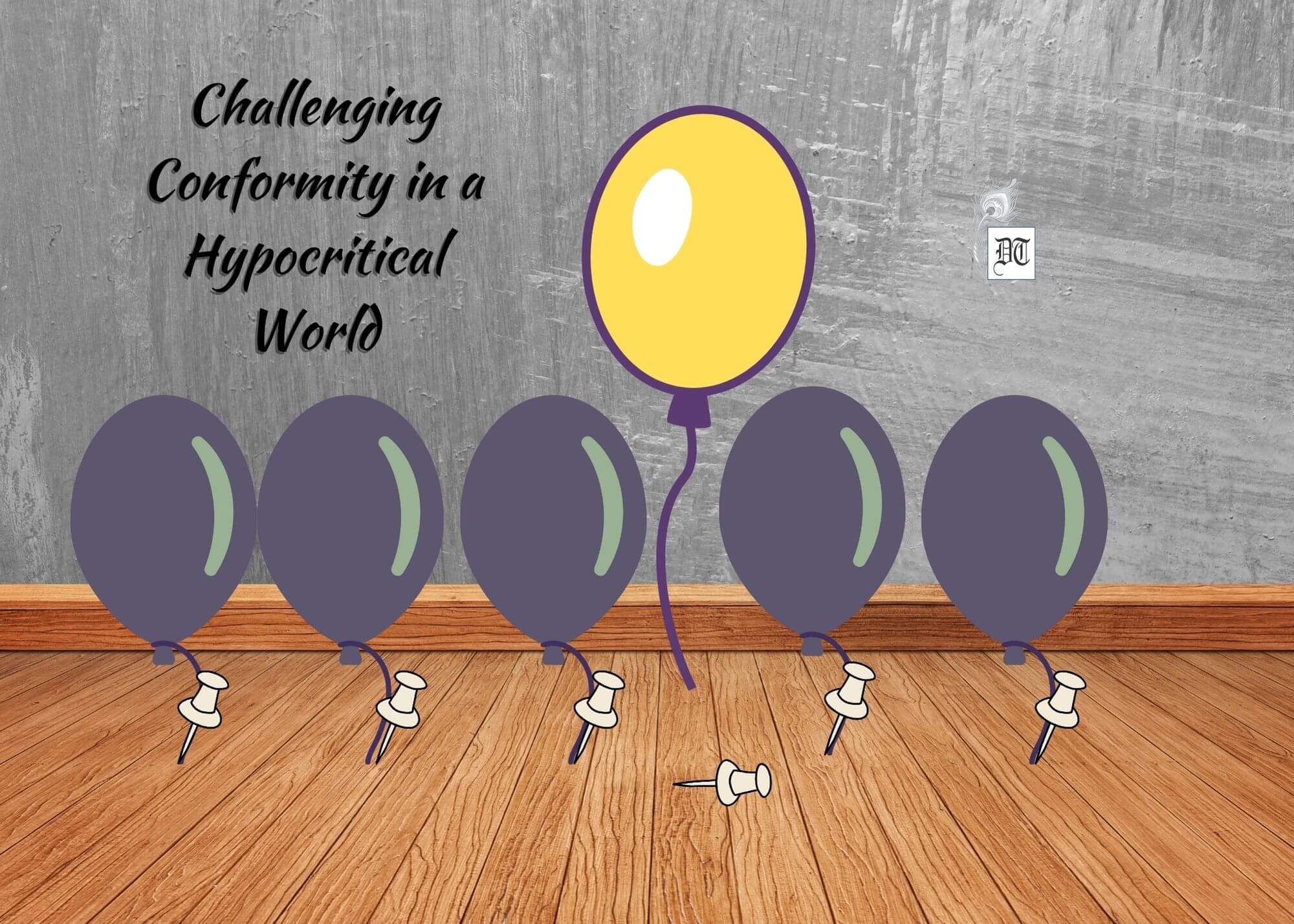Reading Time: 4 minutes
Dr Molly, in an exclusive for Different Truths, rues that in a world where conformity reigns and truth hides behind masks, can the “not to be” of dissent still pave the way for a better tomorrow?
I was trying to re-read the very thought-provoking, centuries-old Shakespearean quote: “To be or not to be.” Here is an interpretation that offers points of departure from the conventional use of the quote for empowerment (to mean you decide, you are the author of your destiny) or in the sense of bafflement of man confronting choices (whether to do this or that).
Let us look at it from the flip side, which deviates from the conventional, juxtaposed against the realities of the day.
True, the common and ordinary make it a survival strategy to fall in line with the flawed system.
True, the common and ordinary make it a survival strategy to fall in line with the flawed system. They think life is short Lease here on earth, why should one dare pawn its safety and ease of living?
We live in a period when we are fully aware that hypocrisy shrouds everything and greed for dominance persists on the political and the personal plane. All ethical moorings are shattered to winds when truth and honesty masquerade seeking paid publicity through social media.
There was more candid resistance to injustice in former days, and you felt a prick of conscience when you did not raise a single finger. But see the mood of the public now. The glitter attracts a few people. chances of supporting the agenda set, and very few resist unless it is for them to further their political interests.
But The majority opt to go with the flow. Why?
But the majority opt to go with the flow. Why? They perhaps think it is better to go with the flow with a conformity bias rather than shouting out notes of highly risky behaviour, non-conformity, or resistance. Simply opting for “to be,” i.e., the status quo.
This goes the same way with most writers, poets and thinkers too, though there are some exceptions.
Look at history. Poets like Rabindranath Tagore (his bold stance during that seminal period of Independence struggle, refusing to accept the honours doled out) were some such rare souls unafraid of ‘not to be’ who opened pathways anew in thinking and saved mankind from stooping into irretrievable folly.
Even these days, how many, like Gauri Lankesh (a journalist), have courted death for their vehement resistance to injustice? Whatever the blame we throw at social media, there are rare exceptions that show the strength to unveil the truth, not the distorted truth.
Let me quote an example. I live in a village so far unmolested by growing, grabbing corporate claws. But it came one day, on garbs of an industrial unit aimed at giving employment to many. Two landlords rented out their land at high bidder to start it, assuring villagers that it has nothing to do with pollution, be it through air or sound.
But gradually the immediate neighbours started inhaling toxic smells of varnish and paint…
But gradually the immediate neighbours started inhaling toxic smells of varnish and paint connected with large-scale spray painting of parts of cars, the harsh sounds of its assembling. Though in the beginning, it served only as a storage house of cars lorries and all, later large-scale repair work was done much to the annoyance of villagers with piercing thuds and sounds.
Of course, as they promised, some people got employment, but at what a terrible cost! Health hazards came up with bronchial problems and suffocation affecting the children and the aged most.
The government that promotes growing industrial units (banked by the pumping of money by the corporates) kept a selective silence to the protestors’ pleadings to remove the unit or minimise pollution. They deemed it a preferably ignored area of grievance, which gave support to the landlords who rented out the land.
I was one among the protesters, a group of environmentalists and suffering souls with me, going for Dharnas in front of the industrial unit, signing and sending petitions.
While we stood outside, protesting and raising slogans of resistance, l looked at the ordinary employees, happy with the job they got, grateful to their employer, looking at us as destroyers of their “to be” that flows on ease at their households because they have work.
I cannot blame them.
… it is the syndrome that works, the grab of the short-term benefit. It is the “Sphota effect” …
Yes, it is the syndrome that works, the grab of the short-term benefit. It is the “Sphota effect” wherein governments and corporations know. That the public memory is so short because the people remember the last image of goodness and freebies doled out by political parties rather than the thousand wrongs committed by a regime. Yes, the public prefers, and wants to play safe, opting for “to be.”
But there are sane voices still at work, dissonant noises opting for “not to be.” Otherwise, how can mankind pull on… if not for one generation but for the next, they resist and protest!
Not every farmer, not every teacher, not every poet lazes over the immediate and is complacent. She works assiduously, against the grain, for justice, for good and kind days to dawn if not today but tomorrow or the day after!
Picture design by Anumita Roy














An even handed plume which flows effortlessly to tease the mind.